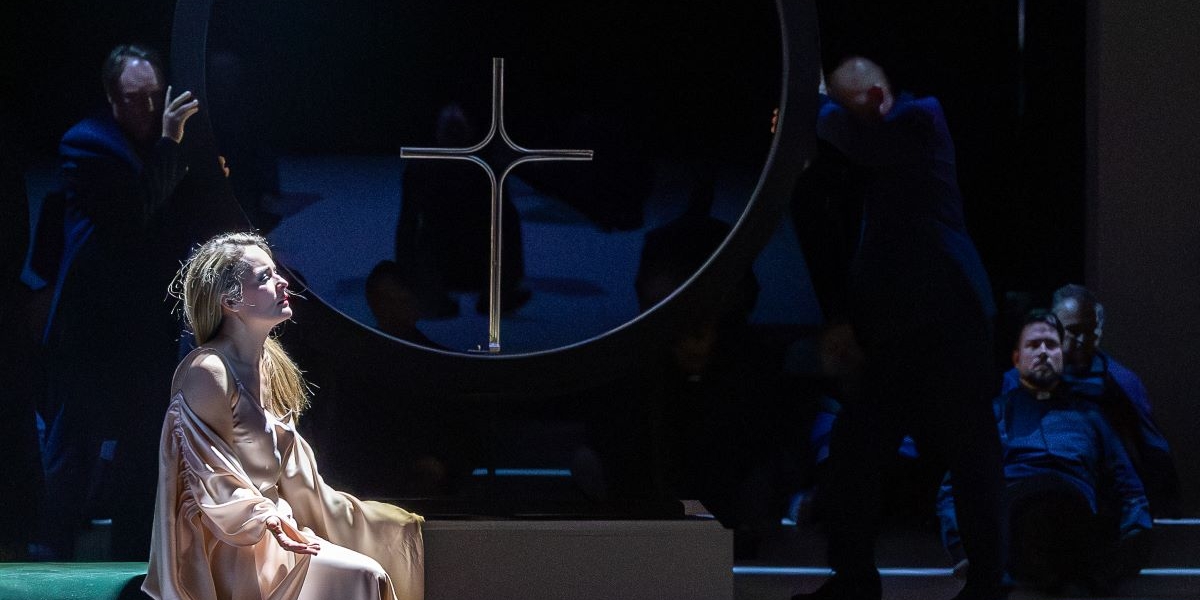Having seen Plzeň’s new traditional production of Armida three days before, I looked forward to seeing Prague’s new interpretation. The synopsis in my Plzeň review; Armida is in essence an oriental Rusalka with a doomed love for a prince from another world.
People loved Dvořak’s operas because he used Czech folklore and dance music. They did not like the oriental story using new oriental sounds and the première had a lukewarm reception, nor did they appreciate that Armida was a masterpiece when Dvořak was at the height of his powers. Armida had only seven performances, and no revival until 1928. This neglected masterpiece is a musically rich and powerful work and back in the repertoire after finally receiving the recognition it deserves.
Dervishes whirl throughout the overture, close the opera and often whirl through the action. It is a good idea at first, but eventually quite dizzying.
The ‘everything set’ is a drawing room with sofa – the royal court, the military camp, and the enchanted palace. A large ring descends, containing a gazelle, symbolic of Armida’s hunting/desires. The ring ascends and descends multiple times for different reasons: it becomes irritating.
Ismen, in long black robe, looking like Alan Rickman’s Snape in Harry Potter without the wand, conjures up an impressive huge dragon which appears breathing fire, and keeps annoyingly reappearing, symbolising Ismen plotting. There is no magical imagery for visions of the burning camp, or castles as seen in Plseň. As both Ismen and Armida are wizards, there disappointingly are no wizard wars: what a lost opportunity!
The crusaders have no chain mail or large red cross, but have vicar’s collars. It is abhorrent enough that large armies went killing ‘infidels’ with the Church’s blessing, but here, vicars are the soldiers.
Characters inexplicably occasionally move in slow motion, slowing down the action instead of intensifying it.
This is passionate music, but the production rarely allows the lovers to get close. When Rinald kills Armida, not realising that she is the stranger who challenged him, his love returns; there is a passionate duet when, dying, she says ‘hold me tightly’. Rinald gives her an emergency baptism before death so they can eventually be together. As they are at opposite sides of the stage, both are impossible; the musical intensity and is dramatic credibility of the end is lost.
The quality of the singers makes up for these problems.
Czech lyric soprano Alžběta Poláčková, as Armida, gives a star performance. Armida is really a dramatic soprano role, but her voice quality allows more vulnerability for the character. She is a multiple award winner. ‘Za ŝtihlou gazelou’, Armida’s first aria, describing her first sight of Rinald hunting for gazelles, (reminiscent of Rusalka’s Moon Song), is breathtakingly sung.
Czech star and Thalia award-winner tenor, Aleŝ Briscein, as Rinald has a bright, dramatically exciting voice, blending well with Poláĉkovà’s lyric soprano; they make a good couple, inasmuch as the production allows. He is superb in this role, also singing it in Pilsň. The demanding Act 4 scene – ‘Sàm, v pouŝti sám o hrůzo’, is a tour de force.
Czech lyric baritone Svatopluk Sem is a quality singer and a Prague regular. His threatening Ismen is sung with dark and menacing tone has ample voice for Ismen’s demanding music.
Czech star baritone Martin Bartà, won a coveted Thalia award last year. His Bohumir showed his lovely voice quality and legato. His stage presence makes Bohumir seem a larger part than it is.
Slovakian bass, Ŝtefan Kocán, well known outside Czechia, having sung at the Metropolitan Opera and ROH Covent Garden. He is a convincing Petr, the hermit who sees through Armida’s lies.
Robert Jindra, the conductor, brings excitement and thrills from the score.
Unfortunately, director Jiří Heřman left sorcery to the imagination and has not taken advantage of the magic and passion in the drama, for example Ismen’s ‘magic aging disguise’ adds a hardly-visible small beard, and is hopeless. Technology facilitates recreating magic apparitions such as the burning city, the castle appearing and disappearing, explicitly described in the score. As the updated story deals with the clash of Muslim and Christian, more should have been made of the parallels with society today. This is, like Rusalka, a problematic romance between cultures. Such wasted opportunities!
Notwithstanding, the singing is terrific: I loved Armida and recommend opera-travellers to visit Prague, one of the world’s most beautiful cities, with two beautiful opera houses.

